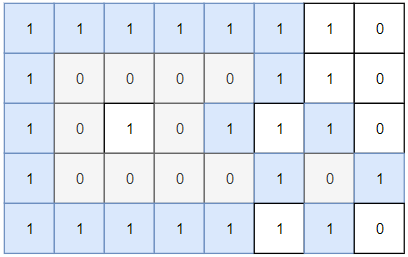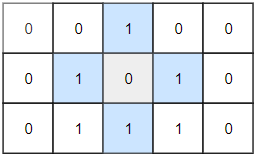https://leetcode.com/problems/number-of-closed-islands/
Given a 2D
grid consists of 0s (land) and 1s (water). An island is a maximal 4-directionally connected group of 0s and a closed island is an island totally (all left, top, right, bottom) surrounded by 1s.
Return the number of closed islands.
Example 1:

Input: grid = [[1,1,1,1,1,1,1,0],[1,0,0,0,0,1,1,0],[1,0,1,0,1,1,1,0],[1,0,0,0,0,1,0,1],[1,1,1,1,1,1,1,0]] Output: 2 Explanation: Islands in gray are closed because they are completely surrounded by water (group of 1s).
Example 2:

Input: grid = [[0,0,1,0,0],[0,1,0,1,0],[0,1,1,1,0]] Output: 1
Example 3:
Input: grid = [[1,1,1,1,1,1,1], [1,0,0,0,0,0,1], [1,0,1,1,1,0,1], [1,0,1,0,1,0,1], [1,0,1,1,1,0,1], [1,0,0,0,0,0,1], [1,1,1,1,1,1,1]] Output: 2
Constraints:
1 <= grid.length, grid[0].length <= 1000 <= grid[i][j] <=1
This is similar to 1020. Number of Enclaves.
Approach 1: Flood Fill
First, we need to remove all land connected to the edges using flood fill.
Then, we can count and flood-fill the remaining islands.
Complexity Analysis
- Time:
O(n), wherenis the total number of cells. We flood-fill all land cells once. - Memory:
O(n)for the stack. Flood fill is DFS, and the maximum depth isn.
int fill(int[][] g, int i, int j) {
if (i < 0 || j < 0 || i >= g.length || j >= g[i].length || g[i][j] != 0)
return 0;
return (g[i][j] = 1) + fill(g, i + 1, j) + fill(g, i, j + 1)
+ fill(g, i - 1, j) + fill(g, i, j - 1);
}
public int closedIsland(int[][] g) {
for (int i = 0; i < g.length; ++i)
for (int j = 0; j < g[i].length; ++j)
if (i * j * (i - g.length + 1) * (j - g[i].length + 1) == 0)
fill(g, i, j);
int res = 0;
for (int i = 0; i < g.length; ++i)
for (int j = 0; j < g[i].length; ++j)
res += fill(g, i, j) > 0 ? 1 : 0;
return res;
}
Solution: DFS/Backtracking
For each connected component, if it can reach the boundary then it’s not a closed island.
Time complexity: O(n*m)
Space complexity: O(n*m)
int closedIsland(vector<vector<int>>& grid) {
const int n = grid.size();
const int m = grid[0].size();
function<int(int, int)> dfs = [&](int x, int y) {
if (x < 0 || y < 0 || x >= m || y >= n) return 0;
if (grid[y][x]++) return 1;
return dfs(x + 1, y) & dfs(x - 1, y) & dfs(x, y + 1) & dfs(x, y - 1);
};
int ans = 0;
for (int i = 0; i < n; ++i)
for (int j = 0; j < m; ++j)
if (!grid[i][j]) ans += dfs(j, i);
return ans;
}
https://algorithm-notes-allinone.blogspot.com/2019/11/leetcode-1254-number-of-closed-islands.html
- int closedIsland(vector<vector<int>>& grid) {
- int res = 0;
- int m = grid.size(), n = grid[0].size();
- vector<vector<int>> visit(m, vector<int>(n, 0));//not needed if we can modify grid' values
- for(int i=0; i<m; ++i) {
- for(int j=0; j<n; ++j) {
- if(grid[i][j] == 0 && !visit[i][j]) {
- bfs(grid, i, j, visit, res);
- }
- }
- }
- return res;
- }
- private:
- void bfs(vector<vector<int>>& gd, int x, int y, vector<vector<int>>& visit, int &res) {
- queue<pair<int, int>> q;
- q.push({x, y});
- visit[x][y] = 1;
- vector<int> dirs = {-1, 0, 1, 0, -1};
- bool ed = false;//this is the only difference
- while(q.size()) {
- auto t = q.front();
- q.pop();
- for(int i=0; i+1<dirs.size(); ++i) {
- int a = t.first + dirs[i], b = t.second + dirs[i+1];
- if(a<0 || a>= gd.size() || b<0 || b>=gd[0].size()) {
- ed = true;//is edge
- continue;
- }
- if(visit[a][b] || gd[a][b]) continue;
- q.push({a, b});
- visit[a][b] = 1;
- }
- }
- if(!ed) ++res;
- }
https://www.cnblogs.com/onePunchCoder/p/11830972.html
private static final int[][] directions = {{0, 1}, {1, 0}, {0, -1}, {-1, 0}}; public int closedIsland(int[][] grid) { int m = grid.length; int n = grid[0].length; int[][] visited = new int[m][n]; boolean flag; LinkedList<int[]> queue = new LinkedList<>(); int result = 0; for (int i = 1; i < m - 1; i++) { for (int j = 1; j < n - 1; j++) { if (grid[i][j] == 0 && visited[i][j] == 0) { flag = true; queue.addLast(new int[]{i, j}); int[] island; int I, J; while (!queue.isEmpty()) { island = queue.pollFirst(); for (int[] direction : directions) { I = island[0] + direction[0]; J = island[1] + direction[1]; if (I >= 0 && I < m && J >= 0 && J < n && grid[I][J] == 0 && visited[I][J] == 0) { visited[I][J] = 1; queue.addLast(new int[]{I, J}); if (I == 0 || I == m - 1 || J == 0 || J == n - 1) { flag = false; } } } } if (flag) result++; } } } return result; }